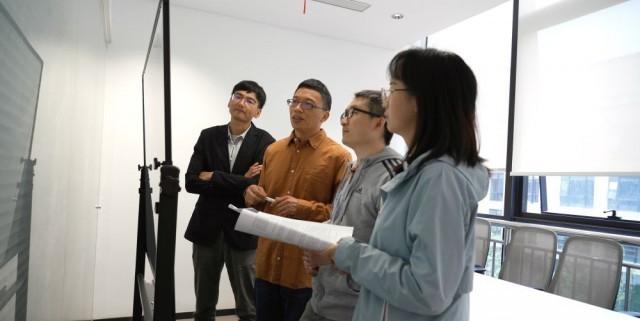Hangzhou, May 4 (Xinhua) -- A quantum computer with 53 qubits takes 200 seconds to complete, and a traditional supercomputer takes 10,000 years. It is believed that quantum computing has superior performance that traditional computers cannot match. However, it only takes 304 seconds to complete the relevant sampling tasks with a higher standard with the supercomputer installed with the "Shenwei Quantum Simulator".
From 10,000 to 304 seconds, this is a peak that China has climbed in the frontier of supercomputing applications, and there is a young team struggling on this road. On the 3rd, the Intelligent Supercomputing Research Center of Zhijiang Laboratory was awarded the 26th "Chinese Youth May Fourth Medal Collective".

The team of the Intelligent Supercomputing Research Center of The River Laboratory discusses the theoretical model. (Courtesy of Zhijiang Laboratory)
Drug screening and viral mutation prediction, accurate forecasting of weather and disasters, research and development of new materials... The development of science and technology and society is challenging the limits of computing. In the face of these difficult problems, how can supercomputing better play its advantages?
During the COVID-19 epidemic in 2020, the intelligent supercomputing research team of Zhijiang Laboratories was inspired by the Shenwei quantum simulator. Most of the people on the team had never been involved in quantum computing, but they were eager to try it out because "it's exciting to do something that no one has ever done before!" In the eyes of this group of enthusiastic young people, they are "sponges", eager for new knowledge, eager for breakthroughs.
On November 19, 2021, the "fledgling" Zhijiang Laboratory Intelligent Supercomputing Research Center came into the spotlight for the first time. The Shenwei quantum simulator developed by a joint team of research units such as the Intelligent Supercomputing Research Center of Zhijiang Laboratory and the National Supercomputing Wuxi Center has won the "Gordon Bell Award", which is known as the "Nobel Prize in the Field of Supercomputing".
"Winning the award is not the end, we must continue to do higher, faster, stronger high-performance computing applications." Liu Xin, a researcher on the quantum simulator team, said. In just three months after that, they significantly improved their performance metrics.
The picture shows the team of the Intelligent Supercomputing Research Center of The River Laboratory at the scientific research site. (Courtesy of Zhijiang Laboratory)
"Build supercomputing, joint supercomputing, and use supercomputing, and strive to achieve a breakthrough in computing power in the era of intelligence." Qin Yi, an engineering expert at the Intelligent Supercomputing Research Center of Zhijiang Laboratory, said they have more "fantastic ideas" to come. For example, the establishment of a supercomputing Internet, the distribution of a number of supercomputing centers distributed in different regions connected, the formation of a larger and more easy-to-use supersumean computing power and algorithm library, to provide support for the "East number West calculation".
This is a new exploration, design, implementation, verification, overthrow, redesign, such a cycle has become the normal work of Qin Yi and his team partners.
"When an idea is overturned, it's inevitable that there will be some low, but I don't have much time to fall down, because I will immediately put in a new round of attempts." Tang Xuefei, a 25-year-old team member, said.
In the second half of last year, several members went to the National Supercomputing Wuxi Center to carry out centralized verification of a number of technologies. The verification was not smooth, and it was originally planned to complete the missions within a week, but it took them a whole month of continuous combat to complete them all.
"Although the intensity is great, the harvest is also great." Tang Zhihang, a 28-year-old team member, was an armed police special operator in college. He said that the intensive research reminded him of the "Devil's Week" extreme training experienced by the armed police special forces.
"We took the initiative to choose a difficult path because we decided in our hearts that it was a promising path." During the May Day holiday, the young team began a new round of three-month intensive research, and the intelligent supercomputing Internet has begun to take shape.
Source: Xinhua News Agency